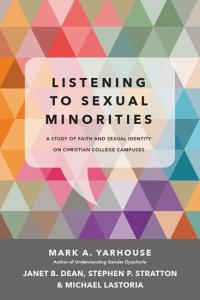
When we think of Christian College, we probably don’t begin by wondering how many students there are LGBT+
In fact, if it weren’t for the current cultural climate and the ubiquity of social media, we might assume that LGBT+ students simply attend other colleges, rather than attending Christian schools. This, combined with other factors, has resulted in a blind spot on the part of both the general Christian population and College/University decision makers when it comes to serving LGBT+ students who attend these institutions. Listening to Sexual Minorities: A Study of Faith and Sexual Identity on Christian College Campuses works to correct at least a part of that.
An important warning up front: this book is not for laymen. It is the collected results of decades of surveys and study by the authors gathered and analyzed using technical terms and contemporary academic methods. Don’t plan to pick this book up and read through it as if it were a novel, or even a more mainstream non-fiction best seller. Which isn’t to say it’s not a useful book! The information gathered here is worth knowning, perhaps especially by administrators, counselors, trustees, and others at colleges and universities who are responsible for this aspect of student life (disclaimer: I work at a Christian university, but my primary function is classroom instruction). This is also a good resource for an outline of current debates over the LGBT+ issue in Evangelical Christianity, including a discussion of the Side A/Side B/Side C/Side X debates.
That said, the academic strength of this book is also a weakness. The authors do an excellent job of presenting the information they gather from their study, and most of their conclusions (which are very, very, restrained conclusions) are proposals that no faithful Christian will disagree with–we certainly should be helping students, whatever their sexual identity, to grow and mature.
And yet, the one topic the book does not really touch is the question of whether or not this is a sin. In fact, the word ‘sin’ does not even appear in the book, outside of a few quotations. At that really does affect not so much the usefulness of the information presented, but rather how that information is going to be used. Is the LGBT+ identity fundamentally shaped by the fall? Or is it a good part of creation? The position the university in question takes on that is going to shape and define how it tries to help students with that identity. This question has to be answered before any of the information gathered by the authors and presented in the book can be of any practical value. It’s all well and good to say that we should be guiding students in their growth–who can disagree there? But with regard to LGBT+ issues, does ‘guiding students’ mean helping them resist or encouraging them to embrace?
Which means at the end of the day, we’re still dealing with a question of Scriptural fidelity, theological rigor, and ethical guidance. I’m not going to try to navigate this question here. All I’m going to do is point out that you should answer this first before you use the tool provided by Listening to Sexual Minorities.
Dr. Coyle Neal is co-host of the City of Man Podcast and an Associate Professor of Political Science at Southwest Baptist University in Bolivar, MO












